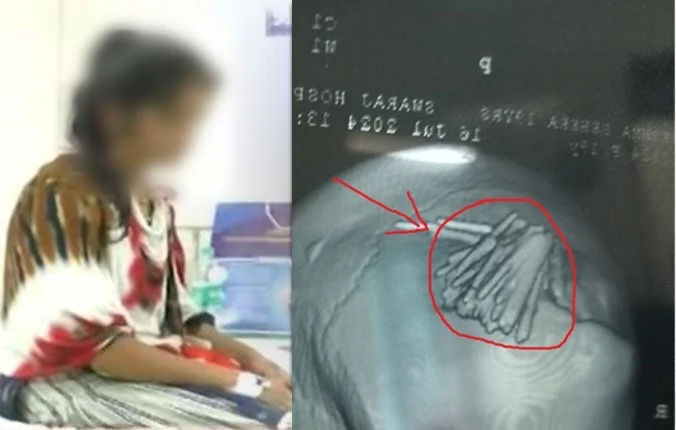Sorcery victim in India undergoes multiple surgeries to remove 77 needles
 Indian woman undergoes surgery to remove 77 needles from skull, Odisha, India, July 19, 2024. (Courtesy of Odisha Bytes)
Indian woman undergoes surgery to remove 77 needles from skull, Odisha, India, July 19, 2024. (Courtesy of Odisha Bytes)
In a shocking incident, doctors at Veer Surendra Sai Institute of Medical Sciences and Research (VIMSAR) in India’s Odisha removed 77 needles from the head of a 19-year-old woman as a result of sorcery.
Reshma Behera, from Ichgaon in Bolangir district, suffered from severe headaches, which led to the discovery of the needles.
Reshma initially sought treatment at Bhima Bhoi Medical College and Hospital, where a CT scan revealed multiple needles in her skull. Despite removing eight needles, her condition did not improve.
Consequently, doctors referred her to VIMSAR for specialized care. For two surgeries, doctors extracted a total of 77 needles.
Director Bhabagrahi Rath of VIMSAR stated, “So far, 77 needles have been retrieved from the girl’s head in two surgeries. Fortunately, the needles have not caused any bone injuries, but there are soft tissue injuries on her head.”
Reshma remains under close observation, and doctors are optimistic about her recovery.
How dangerous can sorcery be?
Frequent illnesses since her mother’s death four years ago led Reshma to seek help from a sorcerer named Tejraj Rana in 2021.
According to her family, Reshma did not know about the needles as she fell unconscious during the sorcerer’s sessions. They discovered the needles recently when she complained of persistent pain.
“She did not know about the needles because she fell unconscious during the sorcerer’s session,” Reshma’s father explained.
The family sought help from the sorcerer when no other treatment provided relief. The sorcerer used to take Reshma into a room for an hour, during which he inserted the needles.
Ongoing investigation, recovery
Police are investigating if other individuals have suffered similar abuses. Reshma’s case points to the significant health risks associated with superstitious practices in rural areas.
Doctors at VIMSAR will continue to monitor Reshma’s recovery closely. Director Rath emphasized the need for a thorough diagnosis before attributing Reshma’s problems to psychological causes.
“The patient is under observation and will be checked for other issues for which she visited the sorcerer,” he noted.
Reshma’s recovery is proceeding well, with continued post-operative care at VIMSAR. Her case serves as a critical reminder of the potentially deadly consequences of superstitious beliefs.
Through increased education and awareness, authorities and medical professionals hope to ensure such incidents do not recur.
The investigation remains ongoing, focusing on preventing further occurrences of such dangerous practices.
Reshma’s story shows the urgent need for modern medical interventions and the dangers posed by relying on superstitious treatments.



